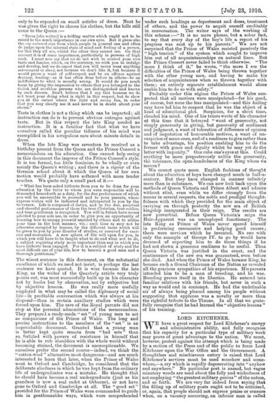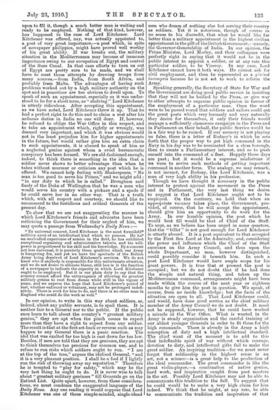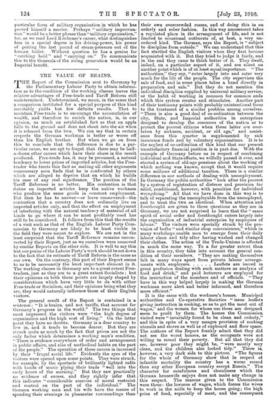LORD KITCHENER. Nv E have a great respect for Lord Kitchener's
energy and administrative ability, and fully recognise that his capacity for a particular type of military work may prove of great advantage to the nation. We must, however, protest against the attempt which is being made by a section of the Press and of the public to force Lord Kitchener upon the War Office and the Government. A thoughtless and mischievous outcry is raised that Lord Kitchener's services must be used somehow and some- where,—a cry which is rapidly degenerating into " anyhow and anywhere." No particular post is named, but vague minatory words are used about the folly and wickedness of not employing " the greatest military genius " of the nation, and so forth. We are -very far indeed. from saying that the filling up of military posts ought not to be criticised, or, again, that people should not express praise or censure when, on a vacancy occurring, an inferior man is called upon to fill it, though a much better man is waiting and ready to be employed. Nothing of that kind, however, has happened in the case of Lord Kitchener. Lord Kitchener was offered, nay, was actually appointed to, a post of very great importance,—a post which, in spite of newspaper philippics, might have proved well worthy of his great ability. If war breaks out, the military situation in the Mediterranean may become of immense importance owing to our occupation of Egypt and control of the Suez Canal. In that case efforts to turn us out of Egypt are pretty sure to be made, and we shall have to meet those attempts by drawing troops from many sources,—from India, from South Africa, and probably from Malta. The advantages of having such problems worked out by a high military authority on the spot and in peacetime are too obvious to dwell upon. To speak of such an appointment, especially as it was under- stood to be for a short term, as " shelving " Lord Kitchener is utterly ridiculous. After accepting this appointment, as we have noted, Lord Kitchener threw it up. That he had a perfect right to do this and to claim a rest after his arduous duties in India no one will deny. If, however, he refused to oblige the War Office in this respect, and to take an appointment which, rightly or wrongly, was deemed very important, and which it was obvious would not in the least prejudice him for higher appointments in the future, but would rather give him an extra claim to such appointments, it is absurd to speak of him as a neglected genius against whom a cruel bureaucratic conspiracy has been formed. We are old-fashioned enough, indeed, to think there is something in the idea that a soldier never shows to better advantage than when he takes without murmur or criticism any post which he is offered. We cannot help feeling with Shakespeare, " No man is too good to serve his Prince," and we might add : " in any duty to which he is called." Brougham said finely of the Duke of Wellington that he was a. man who would serve his country with a pickaxe and a spade if he could serve her in no other way. That is a truth which, with all respect and courtesy, we should like to recommend to the fastidious and critical Generals of the present day.
To show that we are not exaggerating the manner in which Lord Kitchener's friends and advocates have been criticising the Government for their neglect of him, we may quote a passage from Wednesday's Daily News :— "By universal consent, Lord Kitchener is the most formidable military asset of an intellectual kind which we possess. He has an unrivalled experience of armies in the field, he has exhibited exceptional organising and administrative talents, and his will- power is proportioned to his skill and his knowledge. By a consent not less universal, it is precisely these qualities which our Army is hungering for, and yet we have the spectacle of the British Army being deprived of Lord Kitchener's services. We do not know who if anybody is responsible for this unfortunate situation, and we do not desire to allocate blame, still less is it the function of a newspaper to indicate the capacity in which Lord Kitchener ought to be employed. But it is our plain duty to say that the country cannot afford the extravagance of allowing its greatest military genius to rust from disuse while still in the vigour of years, and we express the hope that Lord Kitchener's period of rest, whether enforced or voluntary, may not be prolonged indefi- nitely. There is work for him to do, and there is no other man in England who could do the work as well."
In our opinion, to write in this way about soldiers, or, indeed, about any public servants, is to spoil them. It is neither fair to a. General nor to the public. If the public once learn to talk about the country's " greatest military genius," they are apt when the pinch comes to expect more than they have a right to expect from any soldier. The result is that at the first set-back or reverse such as may happen to any General there is a panic reaction. The idol that was exalted far too high is cast down far too low. Besides, if men are told that they are geniuses, they are apt to think themselves too precious for common use, and to refuse to run risks which soldiers ought to run. " I am at the top of the tree," argues the idolised General, " and it is a very pleasant position. I shall be a fool if I lightly run the risk of throwing away my reputation." Therefore he is tempted to " play for safety," which may be the very last thing he ought to do. It is never wise to talk about " greatest military geniuses " till Generals go on the Retired List. Quite apart, however, from these considera- tions, we must condemn the exaggerated language of the Daily News. Any one reading it would suppose that Lord Kitchener was one of those simple-minded, single-ideal men who dream of nothing else but serving their country as soldiers. Yet it is notorious, though of course in no sense to his discredit, that what he would like far better than a military appointment is the highest civilian appointment in the gift of the British Government,—namely, the Governor-Generalship of India. In our opinion, the Prime Minister, Lord Morley, and their colleagues were perfectly right in saying that it would not be in the public interest to appoint a soldier, or at any rate this particular soldier, to be Viceroy. In any case, Lord Kitchener cannot have it both ways. He cannot ask for civil employment, and then be represented as a Onjral incompris because he is not set to work to reform the Army.
Speaking generally, the Secretary of State for War and the Government are doing good public service in insisting that they will not be bullied by the Press, or give way to other attempts to organise public opinion in favour of the employment of a particular man. Once the word were to be passed round that soldiers and sailors could get the great posts which very humanly and very naturally they desire for themselves, if only their friends would manage a sufficiently clamorous campaign in the Press and in Parliament on their behalf, the public Service would be in a fair way to be ruined. If our memory is not playing us false, there is a letter of Rodney's in which he sets forth that the proper way to get high command in the Navy in his day was to be nominated for a close borough, then to create a Parliamentary interest, and so to push oneself into the command of a fleet. Happily those days are past ; but it would be a supreme misfortune if we were to revive such methods of getting important command in another form. The analogy, we may remark, is not inexact., for Rodney, like Lord Kitchener, was a man of very high ability in his profession.
Though we have thought it necessary in the public interest to protest against the movement in the Press and in Parliament, the very last thing we desire to suggest is that Lord Kitchener ought not to be employed. On the contrary, we hold that when an appropriate vacancy takes place, the Government, pro- vided, of course, that he will accept the appointment, should give him an opportunity to do work for the Army. In our humble opinion, the post which he would best fill would. be that of Chief of the Staff. To urge, as we believe has been urged in some quarters, that the " billet " is not good enough for Lord Kitchener is utterly absurd. It is a post equivalent to that occupied by the First Sea Lord at the Admiralty, and, considering the power and influence which the Chief of the Staff exercises on the Army Council, and thus upon the whole Department, no man, however distinguished, could possibly consider it beneath him. In such a post Lord Kitchener would have ample scope for his great powers. It is true that at present the post is occupied ; but we do not doubt that if he had done the simple and natural thing, and taken up the Mediterranean command, arrangements might have been made within the course of the next year or eighteen months to give him the post in question. We speak, of course, from no inside knowledge ; but the facts of the situation are open to all. That Lord Kitchener could, and would, have done good service as the chief military member of the Army Council we do not doubt. It must not be supposed, however, that he could have worked a miracle at the War Office. What is wanted. in the Army is steady organisation and the careful training of our ablest younger Generals in order to fit them for the high commands. There is already in the Army a high conception of duty and a high intellectual standard. The chief want of the moment is to add to this that indefinable spirit of war without which courage, devotion to duty, and intellectual gifts fail to make the great soldier. An inspiring tradition—for we must never forget that soldiership in the highest sense is an art, not a science—is a great help to the production of the ideal commander. The great commander is like the great violin-player.—a combination of native genius, hard. work, and inspiration caught from past masters in the art. Possibly Lord Kitchener may not be able to communicate this tradition to the full. To suggest that he could. would be to make a very high claim for him indeed. We think that he might, at any rate, be able to communicate the tradition and inspiration of that particular form of military oreanisation in which he has proved himself a master. Perhaps " military improvisa- tion" would be a better phrase than "military organisation," for, as we read Lord Kitchener's career, what distinguishes him in a, special degree is his driving-power, his power of getting the last pound of steam-pressure out of the human boiler. Without question he has a genius for " catching hold " and " carrying on." To communicate this to the Generals of the rising generation would be an Imperial benefit.








































 Previous page
Previous page